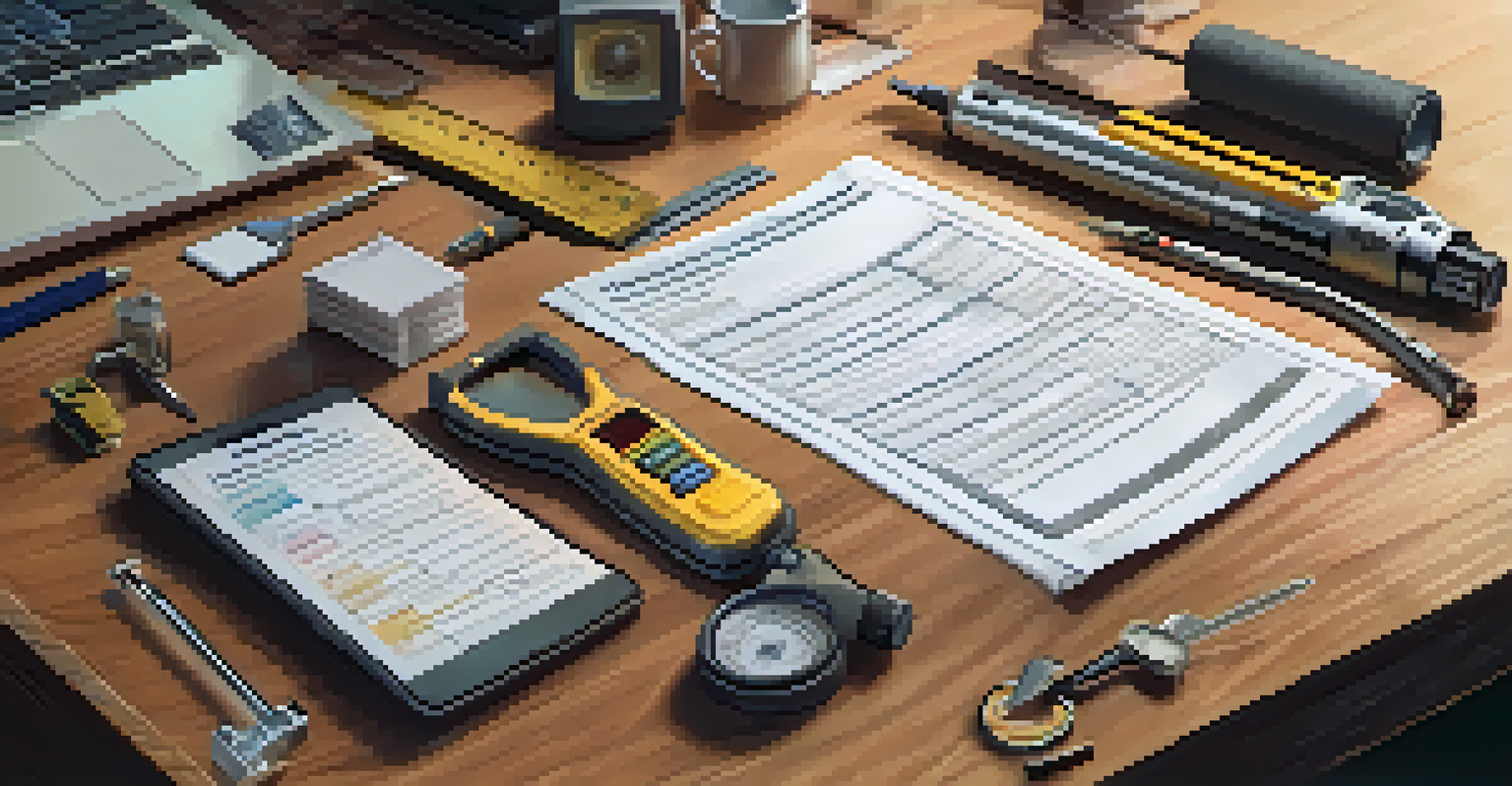How to Choose the Right Home Inspector for Your Renovation

Understand the Importance of a Home Inspection
A home inspection is a critical step in any renovation project. It helps identify potential issues that could affect the integrity and safety of your home. Think of it as a health check-up for your house, ensuring everything is in good shape before you dive into renovations.
An ounce of prevention is worth a pound of cure.
By uncovering hidden problems like plumbing leaks or faulty wiring, a thorough inspection can save you time and money in the long run. Just like getting a second opinion from a doctor, it's always wise to consult a professional. This knowledge allows you to make informed decisions about the renovations ahead.
Investing in a home inspection might seem like an extra step, but it can ultimately lead to a smoother renovation experience. After all, who wants to discover a major issue after they've already started tearing down walls?
Research Credentials of Home Inspectors
When looking for a home inspector, their credentials are paramount. Start by checking if they are certified and licensed in your state, as these qualifications ensure they have undergone the necessary training. Think of this as checking a mechanic's certifications before trusting them with your car.

You might also want to look for inspectors who are members of recognized professional organizations, which can provide additional assurance of their expertise. Organizations often require their members to adhere to specific standards and continue their education.
Importance of Home Inspections
A home inspection is crucial for identifying potential issues before starting renovations, saving time and money.
Taking the time to research credentials can help you avoid hiring someone who may not have the right skills for the job. It’s always better to be safe than sorry, especially when it comes to your home.
Ask for Recommendations and Reviews
Word of mouth is a powerful tool when it comes to finding a reliable home inspector. Ask friends, family, or colleagues if they have any recommendations based on their own renovation experiences. Personal stories can provide valuable insights that online reviews may not capture.
Trust your instincts. Intuition doesn’t lie.
In addition to personal recommendations, take a moment to check online reviews. Websites like Yelp or Google Reviews can give you an idea of the inspector's reputation and the experiences of previous clients. Look for inspectors with consistently positive feedback; it’s a good sign they know their stuff.
Combining personal referrals with online reviews creates a well-rounded picture of potential inspectors. This dual approach can help you feel more confident in your choice.
Inquire About Experience and Specializations
Not all home inspectors are created equal, and their experience can vary widely. When interviewing potential inspectors, ask about their years in the business and any specialties they might have. For instance, if your renovation involves an older home, an inspector with expertise in vintage properties might be particularly beneficial.
Consider what types of inspections they typically conduct. Some inspectors may focus on specific systems like roofing or electrical, while others may offer comprehensive inspections. Knowing their strengths can help you choose someone who aligns with the needs of your renovation.
Research Inspector Credentials
Checking the credentials and experience of home inspectors ensures you hire someone qualified and reliable for your project.
Experience often translates to better insights and more thorough inspections. You want someone who can spot the little things—like a seasoned chef noticing when a dish is just a pinch off.
Review Sample Inspection Reports
Before committing to a home inspector, it's a good idea to request samples of their inspection reports. This will give you a clearer picture of how they document their findings and whether their reports are easy to understand. A well-structured report can make a world of difference when you're reviewing issues and planning renovations.
Look for reports that are detailed yet concise, offering clear explanations and actionable recommendations. A good report should highlight not just problems, but also potential solutions or maintenance tips. This approach is similar to reading a recipe that not only lists ingredients but also guides you through the cooking process.
Having access to sample reports can help you gauge the inspector's thoroughness and professionalism. Ultimately, you want someone who communicates effectively and ensures you fully understand the condition of your home.
Discuss Fees and Services Offered
Understanding the cost of a home inspection is essential for budgeting your renovation. Different inspectors may have varying fee structures based on their expertise and the services they provide. Some might charge a flat rate, while others may base their fees on the size of the home or the complexity of the inspection.
Don’t hesitate to ask about what’s included in the inspection fee. Some inspectors may offer additional services, such as thermal imaging or radon testing, which could be beneficial depending on your specific renovation plans. It’s like choosing a meal at a restaurant; you want to know what’s included before you order.
Trust Your Instincts
Building rapport and clear communication with your home inspector is vital for a successful inspection experience.
Being clear about fees and services can help avoid surprises later on. Transparency in pricing is a sign of a trustworthy inspector, so you can focus on your renovation without financial stress.
Trust Your Instincts and Communicate Clearly
After gathering all the necessary information, it’s important to trust your instincts when selecting a home inspector. How did your interactions feel during the initial conversations? A good rapport and clear communication are essential for ensuring you feel comfortable throughout the inspection process.
Don’t hesitate to ask questions or express any concerns during your discussions. A reputable inspector will appreciate your inquiries and take the time to address them. It’s like a good conversation with a friend—open dialogue can lead to a stronger bond and better understanding.

Ultimately, choosing the right home inspector should feel like a collaborative effort. By following your instincts and maintaining clear communication, you’re more likely to find someone who will provide the insights you need for a successful renovation.